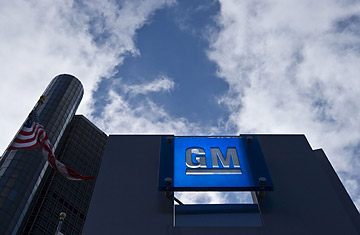
The headquarters of General Motors Corp. in Detroit
General Motors desperately wants to avoid bankruptcy. But at the same time, the automaker is preparing for that possibility. One thing on the to-do list: figuring out where to file for bankruptcy protection, should it come to that.
GM is headquartered in Detroit and employs more than 53,000 people in Michigan, but in the corporate-bankruptcy system, courts compete for cases — especially big ones — so the company could easily wind up at a courthouse hundreds of miles away. Likely venues include Wilmington, Del., the state in which GM is incorporated, and New York City, which has a history of landing large out-of-town cases, such as those involving WorldCom and Enron. (See the 50 worst cars of all time.)
Lawyers — particularly those based in New York City and Wilmington — say the process helps shepherd complicated cases into the hands of experienced judges. Yet some legal experts argue that venue-shopping is a way for companies to run from local suppliers, creditors and employees, making it tougher for those groups to file claims and otherwise participate in the case. "The autoworkers live around Detroit," says Lynn LoPucki, a law professor at UCLA. "You go to New York, and suddenly all of those workers can't sit in the courtroom." (Read "Can Detroit Be Retooled — Before It's Too Late?")
Venue-shopping has been hotly contested in the past. When Congress was updating the bankruptcy code in 2005, Republican Senator John Cornyn of Texas proposed changes to keep more bankruptcies where companies do most of their business. Cornyn had a history with the issue: as attorney general of Texas, he loudly, though unsuccessfully, argued that the Enron bankruptcy should be moved from New York City to Houston so that workers who lost their jobs could watch and local creditors could more easily file claims. As the law now stands, firms can file bankruptcy where they're headquartered, where they're incorporated or where they have an affiliated company in bankruptcy. Enron was able to file in New York City because a commodities-trading subsidiary had already filed there. The reforms Cornyn proposed never made it out of the Senate Judiciary Committee, thanks largely to a powerful member from Delaware — now Vice President Joe Biden.
The result is that certain bankruptcy courts see a disproportionate number of cases. According to a database of public-company bankruptcies maintained by LoPucki, from 1980 to 2008, 17% of companies filed in New York City and 34% filed in Wilmington, even though companies were headquartered in New York City only 7% of the time and in Wilmington less than 1% of the time. Executives typically decide where to file on the advice of their legal counsel. The two law firms that GM has hired to advise it on bankruptcy — Weil, Gotshal & Manges and Dewey & LeBoeuf — are both based in New York City.
The bankruptcy court in eastern Michigan, though, is determined to do what it can to land a possible GM bankruptcy, as well as a potential Chrysler case. In December the court's six judges signed off on new rules that, among other things, allow the chief judge to divvy up the workload of a "very large, complex case of national significance" to keep such a bankruptcy running smoothly and quickly.
Yet even though the Michigan court has deep experience with auto-related bankruptcies — it has handled those of partsmakers such as Collins & Aikman, Intermet and Plastech Engineered Products — and has fielded its share of megacases, including the landmark bankruptcy that resulted from lawsuits against Dow Corning over silicone breast implants, landing GM may be an uphill battle. "The [lawyers] for the automobile companies sleep much closer to New York and Delaware than they do to Detroit," says Hugh Ray, a partner at the Houston-based law firm Andrews Kurth who is also admitted to the New York bar. "You're afraid of what you don't know, and it's easy to tell a client they face a great deal of uncertainty, when what they should tell the client is, 'I don't know much about Detroit.' "
The effect of venue-shopping, contends LoPucki, is that courts wind up more often ruling in favor of companies — to the detriment of creditors and labor unions. "Whoever gets this case must rule for management, or else they'll never get another corporate case," he says. Others aren't convinced the outcome is so nefarious, though the system certainly does give particular judges more than their fair share of influence over bankruptcy case law. "You normally expect various decisions through various courts, which creates the opportunity for the development of the law," says Jeffrey Morris, a law professor at the University of Dayton. "But if you're in the same district all the time, decisions are made, and then you're stuck with them. It arguably limits the ability of the law to fine-tune itself."
For GM and the people who would be affected by its bankruptcy, the issues are more prosaic. Consider that scores of suppliers could go under if GM does. Or think of the money owed to hundreds of companies that provide all manner of services to GM. One creditor in the Enron bankruptcy was a local lock-and-safe company; another was an airport car-service firm. Hiring out-of-state lawyers, traveling and staying for months in a city far from home — these might be prohibitive costs to outfits already reeling from GM's fate. "There is no district in this country that has a greater stake in the outcome of a General Motors case than the eastern district of Michigan," says Steven Rhodes, the court's chief bankruptcy judge. "GM is a Detroit company."
Though without pressure from the outside, it may not be a Detroit bankruptcy.
